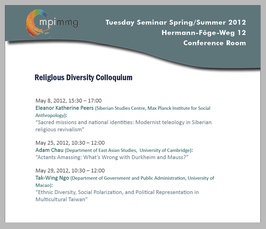"Sacred missions and national identities: Modernist teleology in Siberian religious revivalism "
Tuesday Seminar Spring/Summer 2012
- Date: May 8, 2012
- Time: 03:30 PM - 05:00 PM (Local Time Germany)
- Speaker: Eleanor Katherine Peers (Siberian Studies Centre, Max Planck Institute for Social Anthropology)
- Eleanor Katherine Peers is a Research Fellow at the Siberian Studies Centre, Max Planck Institute for Social Anthropology. She received her PhD from the Faculty of Psychology, Politics, Sociology and International Studies at the University of Cambridge, Great Britain.
- Location: MPI-MMG, Hermann-Föge-Weg 12, Göttingen
- Room: Conference Room

For more details please contact vdvoffice(at)mmg.mpg.de.
This paper describes the current racialisation of religion among a non-Russian Siberian people, the Sakha. It combines the ethnographic study of Sakha revivalist shamanism with the interpretation of presentations of Sakha culture in samples of regional newspaper discourse from the Russian Federation’s Sakha Republic, Sakha (Yakutia).
Both the ethnographic data and mass media sources provide evidence that demographic and cultural change in Sakha (Yakutia) is producing a tendency to attach a religious significance to a Sakha identity. The narratives that express these sanctified identities also contain elements derived from the essentialist Soviet-era ideology on nationality and human progress, suggesting that they result from an interaction of ideas stimulated in part by integrationist Soviet policy. For example, eulogies of Sakha shamans emphasise their immersion in ‘traditional’ Sakha culture, while presenting biologised accounts of these shamans’ supernatural powers, which highlight their capacity to surpass biomedicine. These sets of narrative offer answers to questions about personal teleology and value; these questions incorporate a distinctive post-Enlightenment assumption that the human self exists in relation to a universal purpose. I suggest that the Sakha assimilation of European modernist notions of nation, personhood and universal value, via their integration into a Russianised Soviet society, has encouraged a search for an authentic self that is articulated as a crisis in ethnic identity, and which is having a profound influence on this people’s post-Soviet religious revivals. The Sakha case leads me to reflect on the frequent co-incidence of quasi-religious nationalism and rapid modernisation in the contemporary world, and its links with modernist perceptions of human ontology.